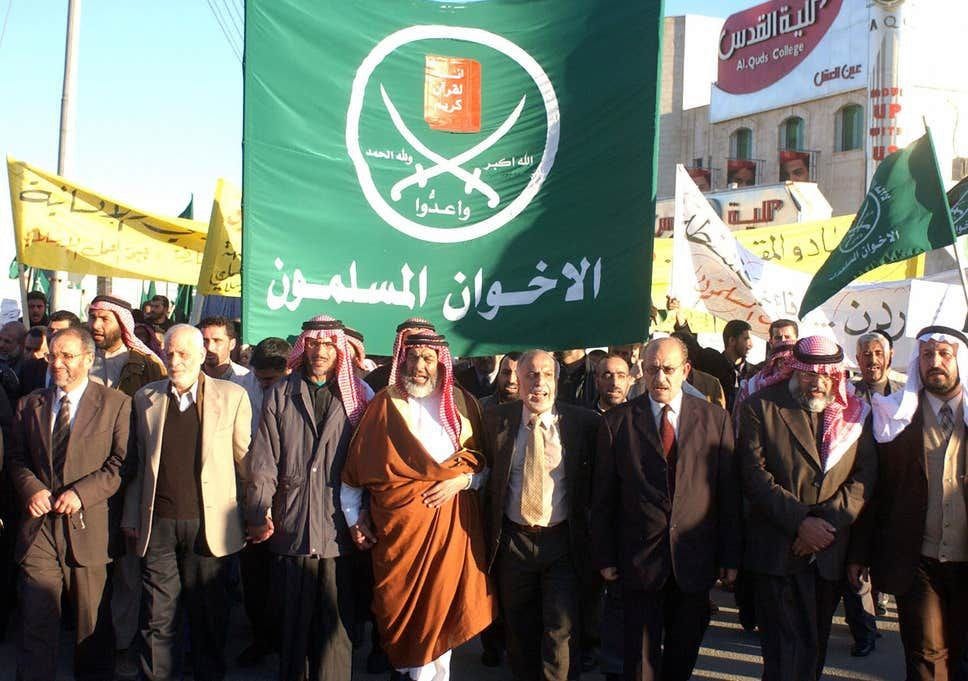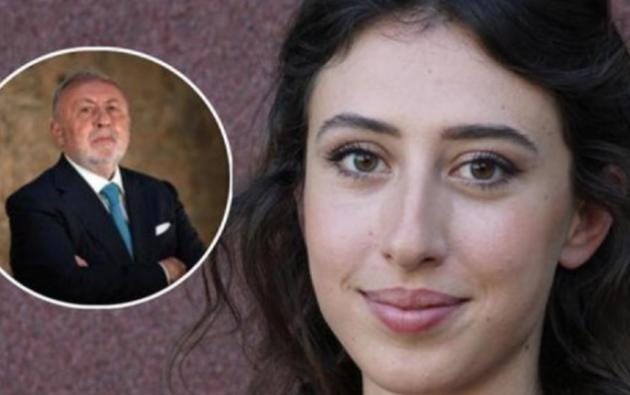The Muslim Brotherhood and the need to recalibrate the compass
+ Who is Cecilia Sala's father, Renato, bank manager and senior advisor at J.P. Morgan and on MPS committees
Time for slight change in formatting, as suggested by one of my readers in the comments. From now on, in this and future posts featuring my English translation of whole articles originally in another language, I will have my text (e.g. this introduction) in Italics and the translation in unformatted text, except of course for emphasis (either original or added). Please let me know what you think of this change in a comment.
Without further ado, here is my English translation of 2 articles, both originally in Italian and from ComeDonChisciotte.org.
The first article, by Mohammad Ali Senobari, was first published on Telegra.ph on Saturday 28th December 2024 and then on ComeDonChisciotte.org on Tuesday 7th January 2025.
(All emphasis mine).
The Muslim Brotherhood and the need to recalibrate the compass
The Muslim Brotherhood, a movement with deep historical roots and ideological ambitions, has become a controversial entity in the geopolitical landscape of West Asia. While its rhetoric often emphasises resistance to imperialism and the liberation of Palestine, its actions, intentional or not, often align with the strategic objectives of the Zionist regime. This paradox has raised serious questions about the Brotherhood's role, intentions and internal contradictions.
The Muslim Brotherhood's impact on regional stability
A clear example of this phenomenon can be observed in Turkey's policies under the leadership of the Justice and Development Party (AKP), which operates in a context strongly influenced by Muslim Brotherhood ideology. Turkey's involvement in the Syrian conflict, under the pretext of supporting democracy and protecting human rights, has ended up weakening Syria, a country historically considered a stronghold of resistance against the Zionist regime. The Zionist entity directly benefited from the disintegration of Syria's state structures and the paralysis of its military capabilities, eliminating a major adversary on its borders. Enemy aircraft conducted hundreds of attacks on Syria's strategic military stockpiles to neutralise any future threat, while Turkey and the new Syrian rulers stood by and watched.
The parallels between Turkey's manoeuvres in Syria and the emerging strategies of the Brotherhood in Egypt are striking. In both cases, the rhetoric of reform and liberation masked policies that led to fragmentation and instability. If this trajectory continues, Egypt, like Syria, risks becoming a theatre of chaos, internal conflicts, and the erosion of its military capabilities, a scenario that aligns worryingly with the Zionist regime's long-term goals.
The Zionist strategy of regional fragmentation
The Zionist entity has long pursued a strategy of regional fragmentation to ensure its dominance. By systematically weakening neighbouring states, often referred to as “ring-states”, it ensures the absence of credible military threats. This strategy began with Syria, a state whose strong military once posed a significant challenge to Israeli ambitions. The collapse of Syria's military capabilities due to a protracted conflict was a major victory for the Zionist regime.
Egypt is now the next critical target. With its rich history, strategic location, and one of the strongest armies in the Arab world, Egypt's stability is of paramount importance. However, the activities of the Muslim Brotherhood threaten to undermine this stability. If Egypt's military and governmental structures falter, the Zionist regime will find itself even safer from potential threats.
After Egypt, Jordan and Iraq seem to be the next candidates for destabilisation. Jordan's strategic location and Iraq's vast resources make them prime targets. The Zionist regime's plan for the region is clear: dismantle the armies and governmental structures of neighbouring states to ensure unchallenged dominance. The Muslim Brotherhood's actions, whether driven by ideological errors, external manipulation, or internal failures, inadvertently align with this project.
The internal crisis of the Muslim Brotherhood
To understand this trajectory, it is necessary to examine the internal dynamics of the Muslim Brotherhood. Once a movement focused on the liberation of Jerusalem and the restoration of Islamic dignity, it is now plagued by strategic drift and ideological contradictions. The disconnect between its founding principles and the actions of its current leadership is stark. While the Brotherhood's grassroots members may remain committed to the cause of liberation, the leadership has often adopted policies that contradict this goal.
This internal crisis is exacerbated by the presence of compromised or infiltrated leaders within the Brotherhood. These individuals, influenced by external forces or driven by personal ambitions, have succeeded in diverting the movement from its original path. Their decisions not only undermined the Brotherhood's credibility, but also made it vulnerable to manipulation by outside powers, including the Zionist regime and its allies.
Strategic deception and the future
The Muslim Brotherhood's failure to recognise and address the strategic deception it faces has been a catastrophic misstep. The rhetoric of democracy and reform has been used as a weapon against it, creating divisions and fostering alliances in the service of external agendas. The Brotherhood's leadership must face the uncomfortable reality that its actions, in many cases, have undermined the very goals it claims to defend.
For the original members of the Muslim Brotherhood, those who truly aspire to liberate Jerusalem and resist occupation, this is a critical time to come to terms. They must overcome complacency and inaction, challenging the leadership's strategic errors. Failure to do so will not only erode their credibility, but also implicate them in advancing the Zionist agenda.
The trajectory of the Muslim Brotherhood has profound implications for West Asia at large. By weakening key states like Syria and Egypt, the Brotherhood has unwittingly contributed to a regional landscape of fragmentation and conflict. This environment not only benefits the Zionist regime, but also perpetuates cycles of instability that undermine the region's ability to resist external domination.
The liberation of Jerusalem, a cause that resonates deeply throughout the Islamic world, cannot be achieved through alliances and policies that weaken the fundamental structures of the region. The Muslim Brotherhood must recognise that their current path is unsustainable. A return to its original principles, coupled with a strategic recalibration, is imperative.
The Muslim Brotherhood is at a crossroads. It can either continue on its current path, marked by strategic missteps and ideological drifts, or embark on a profound process of introspection and reform. This process must begin with an honest assessment of its role in promoting or hindering the cause of resistance.
Authentic members of the Muslim Brotherhood must reclaim the movement's original vision and unite against the leadership's complicity in policies that serve external agendas. They must prioritise the liberation of Jerusalem not just as a rhetorical goal, but as a tangible objective that requires strategic clarity and unity.
The stakes have never been higher. The Zionist regime's ambitions extend beyond Palestine and include the fragmentation and subjugation of the entire region. The actions of the Muslim Brotherhood, whether intentional or not, have so far helped advance this agenda. Now is the time for decisive action. Failure to act will not only tarnish the legacy of the Muslim Brotherhood, but will also accelerate the realisation of the expansionist goals of the Zionist regime.
The future requires courage, clarity, and an unwavering commitment to the principles of justice and resistance. For the Muslim Brotherhood and the entire region, the choice is clear: recalibration or collapse.
The second article, originally published on Il Giornale d’Italia and on ComeDonChisciotte.org on Sunday 5th January 2025 (thus before Cecilia Sala’s return to Italy), explains who Cecilia Sala’s father is and thus why Iran may have taken her “hostage” and why her case got so much attention in the Western media (not just because she is a “presstitute”). On the other hand, Iranian engineer Mohammad Abedini-Najafabadi is still under arrest in Italy without any charge according to Italian and international law. For more background information about the two cases, please refer to this article of mine. (All formatting original).
Who is Cecilia Sala's father, Renato, bank manager and senior advisor at J.P. Morgan and on MPS committees
Since 2004 the father of the journalist arrested in Iran has held the position of senior advisor for Italy at J.P. Morgan International Bank, a leading global financial institution
Renato Sala is the father of Cecilia Sala, the journalist arrested in Iran on 19th December [2024]. He is a prominent figure in the Italian banking scene, known for his long career in the financial sector. Today he is also known through the affair involving his daughter, Cecilia Sala, a foreign policy reporter currently detained in Iran. Her father, together with her mother, has been the spokesperson for official communications on the case, keeping media and institutional attention high on the situation.
Professional career, who is Renato Sala
Renato Sala graduated in Law from the Catholic University of the Sacred Heart in Milan. His career in the banking sector began at Banca Popolare di Milano, where he gained significant expertise in technical and regulatory matters, working with important institutions such as the Bank of Italy and the Italian Banking Association.
Since 2004, he has been senior advisor for Italy at J.P. Morgan International Bank, a leading global financial institution. Here he provides strategic advice on complex financial transactions, helping to strengthen the bank's presence in the Italian market.
In 2023, he was also appointed as an independent director of Banca Monte dei Paschi di Siena (MPS), one of the oldest banks in the world, where he participates in the Nomination and Remuneration Committees. In addition, Sala is CEO of Advisor S.R.L., a specialised consulting firm, and participates in the think tank Greenmantle, which provides high-level macroeconomic and geopolitical analysis.
Private life and public role
Renato Sala is married to Elisabetta Vernoni, a manager and environmental activist, with whom he had Cecilia, born in 1995 in Rome. In recent days, Sala has taken on a major public role, updating Italian and international public opinion and institutions on his daughter's detention in the Evin prison in Tehran.
Cecilia Sala, a well-known journalist for Il Foglio and co-author of podcasts for Chora Media, has been detained since 19th December 2024 on charges of violating Iranian laws, according to the Ministry of Culture of the Islamic Republic.







The Muslim Brotherhood:
Ismaele, who in your opinion has infiltrated the TMB?
Is this CIA/Mossad or other Muslim derivatives? Or all?
the new formatting is good!
quote from wikipedia - "On 3 January 2025, Iran reportedly asked for a prisoner swap.[17] On 8 January 2025, Italian Prime Minister Giorgia Meloni announced that Sala had been released by Iranian authorities and had left the country,[18] later landing at Rome Ciampino Airport in the afternoon of the same day.[19] Meloni cited a triangulation between US, Italy, and Iran helped for her to be released while denying Elon Musk being involved.[20][21]
https://en.wikipedia.org/wiki/Cecilia_Sala